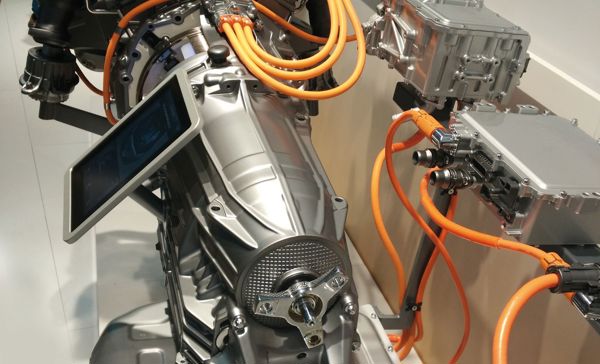- Elkem
- Mobility & transportation
- Electrification & on-board electronics
- Automotive battery cables
Silicone rubber solutions for Automotive Cables
Silicone rubber: the material of choice to insulate and durably protect cables in EV, HEV and ICE vehicles

Battery and cabling systems are at the heart of all automobiles, whether they are powered by traditional internal combustion engines (ICE) or are the driving force in hybrid or electrical vehicles (HEV & EV).
In traditional ICE, cables must withstand huge fluctuations in temperatures under the hood and so must be perfectly insulated and fire-resistant at very high temperatures.
EV vehicles require an ever-increasing number of cables to ensure conductivity and manage temperature spikes due to a high throughput of electrical energy. Because of the sheer quantity of cables and the complexity of their inter-connectivity in the engine housing, EV cables must also be lightweight and highly flexible.
Finally, hybrid vehicles must withstand both the heat generated by ICE and ensure the power supply of their electrical motors in a very limited space.
Why is silicone the material of choice to insulate automotive cables?
The overriding advantage of silicone rubber as the insulation material of choice for battery cables is their unequaled ability, compared to all other insulation materials (PVC, polyethylene, etc.), to withstand huge temperature variations from -60C to +250°C. Elkem cable insulation materials are tested to remain stable at 200°C for 3000 hours or 180°c for 3000 hours (depending on the requirements). This means that they can adapt to the heat generated by traditional motors and can optimize the Thermal Management Systems (TMS) of EVs, i.e. the ability to control the entire temperature system of battery-powered systems and optimize heat and power transfer, conduction and convection, to reduce thermal runaway.
Flexibility is another key reason for using silicone rubber for battery cables. This is a major consideration for the entire automotive industry, both OEMs and parts makers, in designing and assembling their engines, which have increasingly complex wiring in very tight motor housings, often requiring U-shaped or hairpin curves to connect different engine parts. This flexibility is an important factor in reducing manufacturing processing time and improving efficiency.
How does silicone contribute to a better environment, ensure safety and meet regulatory and quality requirements?
Silicone insulation materials for automotive cables are very lightweight compared to other materials that meet high temperature, thus contributing to energy savings and improving the environmental impact in all cars and, for EV vehicles in particular, increasing their overall level of autonomy, a major performance criterion for consumers.
Silicone insulation materials also provide the highest level of safety because of their fire-retardant properties and their unique capacity to self-extinguish, avoiding propagation when flames do ignite in the engine housing.
Finally, Elkem’s silicone solutions for automotive cable products are compliant with the highest regulatory and quality requirements, benefiting from ISO 6722 and 14572 certifications. They meet the highest industry standards, including LV 112 and LV 216, the quality benchmark used by leading carmakers worldwide.
Our product offering
- BLUESIL MF 8160 U is our general-purpose wire and cable insulating compound, which can be used with or without extending filler (e.g. ground quartz) for both air vulcanization (HAV) and steam vulcanization (CV). It is especially designed as wire and cable insulating material.
- MF 8365 E (orange) is our silicone rubber compound specifically designed for LV 216 and high-voltage cables, featuring for efficient insulation, hardness for durability, tensile strength for reliability over thousands of uses, the highest level of elongation at break and tear strength to enable maximum length and volume resistivity for heavy-duty cables.
Advantages:
- Easy processing
- No post-cure
- Excellent electrical characteristics.
- Excellent heat stability, up to 300°C
- Bright colors easily obtained for wire identification
- High mechanical properties: high tear strength and high elongation at break.
Why choose Elkem for your automotive cable insulation materials?
Our teams of silicone rubber experts have been serving the automotive industry for over 50 years. They are available to develop specific and innovative solutions to produce the ingredients and formulations you need to optimize your manufacturing processes.
We have developed a culture in line with the demanding requirements of automotive supply chain systems. This includes risk management based on double-sourcing plans, so Tier 1 suppliers and OEMs always receive the products they need on time. Elkems also provides customization and reprocessing services to its clients through its Mix & Fix™ Centers, conveniently located near major automotive production centers on all continents.
Other services also include regulatory support, assistance to roll out productivity programs, training for teams and collaborative work on new developments. Their ultimate goal: to provide the entire automotive industry with the best tailor-made products and services in order to help to satisfy end customers.
Contact us
Take your business to the next level by partnering with a world-leading material manufacturer.